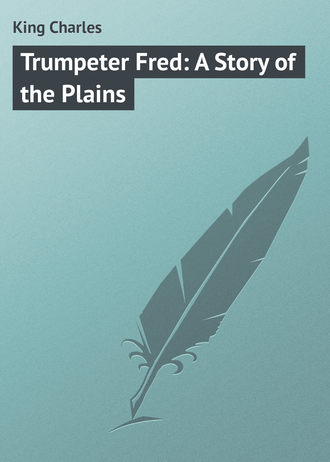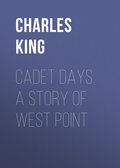
King Charles
Trumpeter Fred: A Story of the Plains
CHAPTER I.
A DANGEROUS MISSION
THERE were only thirty in all that night when the troop reached the Niobrara and unsaddled along the grassy banks. Rather slim numbers for the duty to be performed, and with the captain away, too. Not that the men had lack of confidence in Lieutenant Blunt, but it was practically his first summer at Indian campaigning, and, however well a young soldier may have studied strategy and grand tactics at West Point, it is something very different that is needed in fighting these wild warriors of our prairies and mountains. Blunt was brave and spirited, they all knew that; but in point of experience even Trumpeter Fred was his superior. All along the dusty trail, for an hour before they reached the ford, the tracks of the Indian ponies had been thickly scattered. A war party of at least fifty had evidently gone trotting down stream not six hours before the soldiers rode in to water their tired and thirsty steeds. No comrades were known to be nearer at hand than the garrison at Fort Laramie, fifty long miles away, or those guarding the post of Fort Robinson, right in the heart of the Indian country, and in the very midst of the treacherous tribes along White River. And yet, under its second lieutenant and with only twenty-nine "rank and file," here was "B" Troop ordered to bivouac at the Niobrara crossing, and despite the fact that all the country was alive with war parties of the Sioux, to wait there for further orders.
"Only twenty-nine men all told and a small boy," said Sergeant Dawson, who was forever trying to plague that little trumpeter. It was by no means fair to Fred Waller, either, for while he was somewhat undersized for his fifteen years, his carbine and his Colt's revolver were just as big and just as effective as those of any man in the troop, and he knew how to use them, no matter how hard the "Springfield" kicked. He rode one of the tallest horses, too, and sat him well and firmly, notwithstanding all his furious plunging and "buckings," the day that Dawson slipped the thorny sprig of a wild rosebush under the saddle blanket.
From the first sergeant down to the newest recruit, all the men had grown fond of little Fred in that year of rough scouting and campaigning around old Red Cloud's reservation – all of them, that is to say, with the possible exception of Dawson, who annoyed him in many ways when the officers or first sergeant did not happen to be near, and who sometimes spoke sneeringly of him to such of the troopers as would listen, but these were very few in number.
Fred was the only son of brave old Sergeant Waller, who had served with the regiment all over the plains before the great war of the rebellion, and who had been its standard-bearer in many a sharp fight and stirring charge in Virginia. Now he carried two bullet wounds, and on his bronzed cheek a long white seam, a saber scar, as mementoes of Beverly Ford, Winchester, and Five Forks, and through the efforts of his war commanders a comfortable berth as ordnance sergeant had been secured for him at one of the big frontier posts along the railway. Fred was the pride of the old soldier's heart, and nothing would do but that he, too, must be a trooper. The boy was born far out across the plains in sight of the Chihuahua Mountains, had followed the regiment in his mother's arms up the valley of the Rio Grande to the Albuquerque, then eastward along the Indian-haunted Smoky Hill route to Leavenworth. When the great war burst upon the nation little Fred was just beginning to toddle about the whitewashed walls of the laundresses' quarters – his father was Corporal Waller then – and his baby eyes were big as saucers when he was carried aboard of a big steamship and paddled down the muddy Missouri and around by Cairo and up the winding Ohio to Cincinnati. He was even more astonished at the railway cars that bore the soldiers and a few women and children eastward and finally landed them at Carlisle. There at the old cavalry barracks the little fellow grew to lusty boyhood, while his father was bearing the blue and gold standard through battle after battle on the Virginia soil. And when the war was over and the regiment was hurried out to "the plains," and again to protect the settlers, the emigrants, and the railway builders from the ceaseless assaults of the painted Indians, little Fred went along, and his soldier education was fairly begun.
Old Waller was now first sergeant of "B" troop. The regimental commander and most of the officers were greatly interested in the laughing, sun-tanned, blue-eyed boy, who rode day after day on his wiry Indian pony along the flanks of the column, scorning, though barely seven years old, to stay in the wagons with the women and children. Everybody had a jolly word of greeting for Fred, and kind-hearted Captain Blaine set his "company tailor" to work, and presently there was made for the boy a natty little cavalry jacket and a tiny pair of yellow chevrons. "Corporal Fred" they called him then, and, though he strove hard not to show it, grim old Sergeant Waller was evidently as proud and pleased as the child. He taught the little man to "stand attention" and bring up his chubby brown hand in salute whenever an officer passed by, and most scrupulously was that salute returned. He early placed the boy under the instruction of the veteran chief trumpeter, and made him practice with the musicians as soon as he was "big enough to blow," as he expressed it. And then, too (for there were no army schools, or schoolmasters in those days), regularly as the day came round and the sergeant's morning duties were done, he had his boy at his knee, book or slate in hand, patiently teaching him the little that he knew himself, and wistfully looking for some better instructor.
CHAPTER II.
THE OATH OF ENLISTMENT
IT was while stationed at old Fort Sanders that Waller's enthusiastic devotion to his new captain and his captain's family began. The former troop commander was ordered to the retired list, broken down by wounds, and the senior lieutenant stepped into his place. Waller bade farewell to his old captain with tear-dimmed eyes – they had served together for over fifteen years – and with much inward misgiving, but not the faintest outward show thereof, saluted the new arrival, a young officer but a soldier through and through; it was not a week before the sergeant had fully satisfied himself as to that. Presently the new captain's family reached the fort and took up their abode; a fair-haired, blue-eyed young mother with two children, a boy and a girl, the eldest being three years younger than Fred; and then began another and strong interest.
That very winter scarlet fever devastated the fort. Few children escaped the scourge. There were a dozen little graves in the cemetery out on the prairie when the long winter came to an end. There were two or three larger graves, and one of these held all that was mortal of Fred's loving mother; he and his stern, sad-faced father were now alone in the world.
And Captain Charlton's little household had not been spared. It was among the officers' quarters that the pestilence had first appeared. Frank and Florence Charlton were among the children earliest stricken. The servants fled the house, as frontier servants will, and their place was promptly supplied by Mrs. Waller. She and her husband would listen to no remonstrance, and Mrs. Charlton, overwhelmed with care and dread, was only too glad to have the strong, cheery army woman's help. Over the little brown cottage the shadow of death hovered for days before it was lifted and borne away, and when at last all danger was over and all was again all hope and peace the sergeant's wife went back to her own humble roof across the parade, and there suddenly sickened and died. When the scourge was finally swept from the garrison and the soft winds began to blow from the South, the stricken old soldier was glad of the chance to go with his troop into the field-service, and was almost happy in one thing. Mrs. Charlton had taken his boy as one of her own, and each day she was teaching him faithfully and well. When the troop rode away from Sanders Fred was left behind to occupy a little room under the captain's roof. "Remember, sir, you are sergeant of the guard, and that house and that household are your special charge for all summer long," were Waller's parting words to his boy.
Regularly as the mail reached the troop during its summer scouting Captain Charlton's home missives had their messages for Sergeant Waller; and soon, to his unspeakable joy, letters all his own, addressed in a round boyish hand that grew firmer every week, began to come as his share of the welcome package. Never would he presume to ask for news, yet the captain was not slow to notice how old Waller was sure to be busy close at hand when the home letters came, and prompt to answer, and with soldierly salute to stand erect before his young commander and strive not to show the pride and delight that tingled in every vein at the glowing words in which Mrs. Charlton told of his boy's rapid progress and his devotion to her and the children. His lip would quiver uncontrollably and his eyes fill; his hand might tremble as it touched the brim of his scouting hat, but the salute was precise as ever.
"I thank the captain, and beg to thank the captain's kind lady," was his invariable formula on such occasions. "I hope the boy will always do his duty."
And then he would face about and stride away with his head very high in the air and his eyes blinking hard, and almost immediately his voice would be heard sternly berating some trooper whose horse had tangled himself in his lariat, or whose "kit" was not stowed in proper shape about the saddle. It was his way of striving to hide the joy those messages brought him, and the men were quick to see through it all, and little "Reddy" Mulligan, reprimanded for the third time within a fort-night, started a laugh all through the bivouac by his whimsical protest:
"It's more good news you've been getting from Fred, sergeant, dear; isn't it now? Faith, I wish he'd play ye a thrick wanst in a while, like other byes. Maybe thin I'd be mintioned to the captain for a corporalship." And for once the veteran turned his back on the laughing troop conscious of defeat.
In '74 old Waller changed the yellow stripes and diamond of the first sergeantcy for the crimson and the star of the ordnance, and the troopers, one and all, said good-by to him with infinite regret. Perhaps Dawson, who was next in rank, may be excepted. He confidently expected to be promoted in Waller's place. But though a dashing soldier and a smart non-commissioned officer, he was not the stanch, reliable man the captain needed, and proved it by celebrating Waller's promotion in a very boisterous and unseemly manner. It was plain that he had been drinking heavily, and though Captain Charlton saved him from arrest and court-martial he would not promote him, and plainly, though privately, told him why. The troop knew it was for this reason, but Dawson swore it was all on account of Waller's influence against him when Sergeant Graham was named in regimental orders as the old veteran's successor.
That same summer, with firm hand and glistening eyes, Waller signed his consent to the enlistment of his son as trumpeter in the old troop. How he watched the boy's glowing face as the oath of enlistment, so often lightly spoken, was solemnly repeated, and Fred was bound to the service of his country. How he trembled from head to foot when, but a few weeks afterward and in the dead of night, Charlton and his men hurried forth to intercept a band of Indians who had swooped down upon the herders south of Laramie Peak. Waller could hardly buckle the cantle-straps of Fred's saddle as the little fellow, all eagerness, was bustling about his horse in the dim light of the stable lanterns. Yet when the captain and Lieutenant Rayburn came trotting briskly down the roadway and the men were silently "leading into line," it was the old sergeant's hand that grasped the boy's left foot and swung him lightly into his seat.
"Whatever happens, sir, mind you keep close to the captain," was his parting injunction to his boy. Then his heels came together with the old cavalry "click" and his twitching fingers were stiffened as they went suddenly up in salute to Mr. Rayburn, who bent down from his saddle to say that they would try and take good care of Fred. But Waller answered:
"I thank the lieutenant. The boy is a soldier now, sir. He must take his chances with the rest." Then with one lingering clasp of the trumpeter's hand, "Join your captain," he ordered, and turned away into the darkness.
But the sentry on No. 6 bore witness to the fact that the ordnance sergeant never went to bed again all that night, and the men sent to unload and store the ammunition that came next day from Rock Island Arsenal declared that old Waller was gruffer than ever. All the next night too, he was awake, waiting, watching for tidings from the North. Nothing came until sunset of the second day, just as the whole command was turning out for retreat parade, and then Corporal Rock rode in with dispatches and trotted straight to where the commanding officer was standing in front of the adjutant's office. All eyes were upon him as he threw himself from the saddle and handed the packet to the colonel. Half a dozen officers hastened to join their commander as he tore it open. The piazzas of the officers' quarters were quickly alive with ladies and children, breathlessly eager to hear the news. The colonel's orderly was seen hastening to the surgeon's house – that looked ominous – then Rock remounted; trotted to Captain Charlton's gate, where Mrs. Charlton was tremblingly awaiting him. "It's all right, ma'am," he hastened to say. "Leastwise the captain's safe, but Mulligan is shot – and Ryan and Sergeant Frazer." She hurried in the house with the precious letter he placed in her hands, and while several ladies hastened to join her, the messenger returned to the office.
All this while Sergeant Waller had stood like a statue under the tall white flag-staff where the non-commissioned staff assembled at retreat, watching every move with dry, aching eyes, and a face gray as his mustache.







